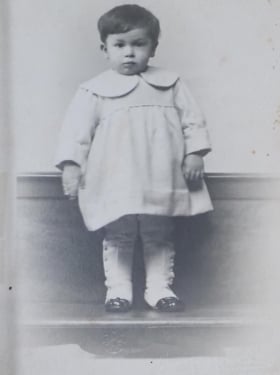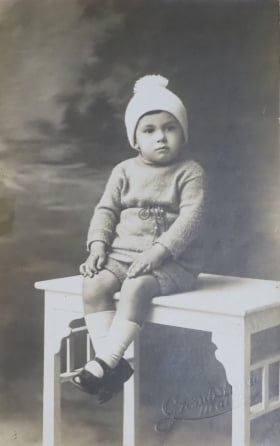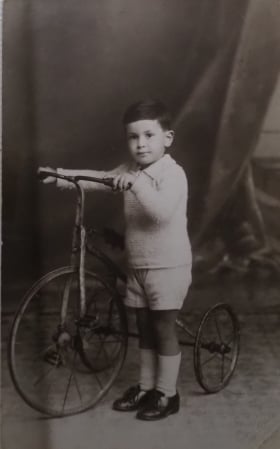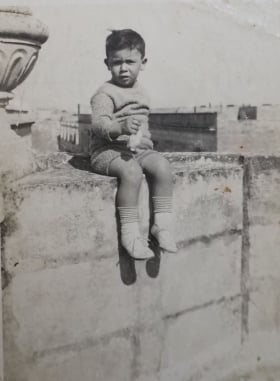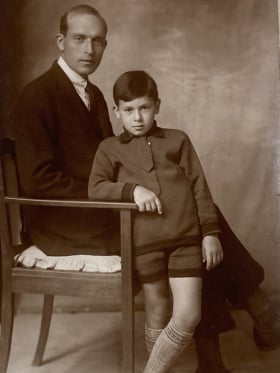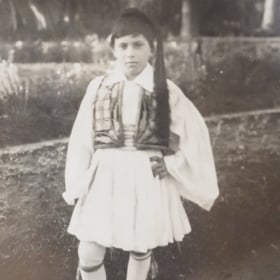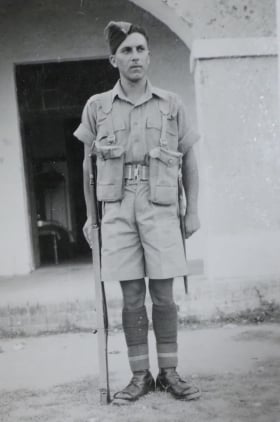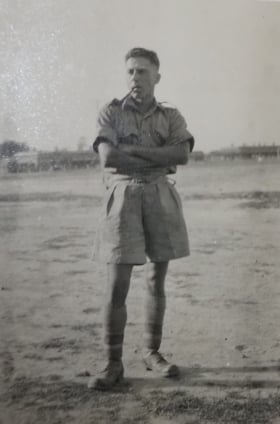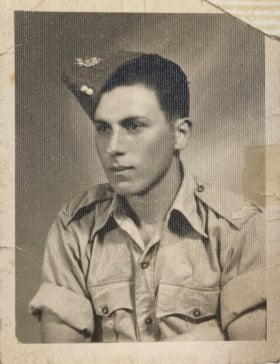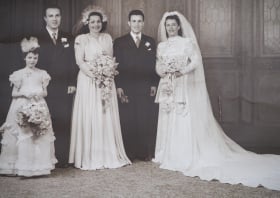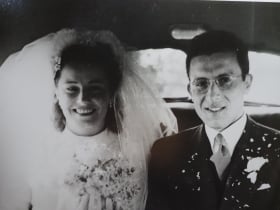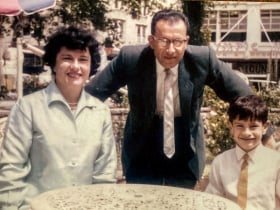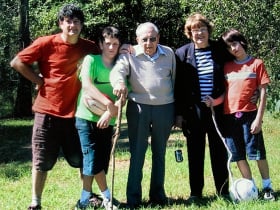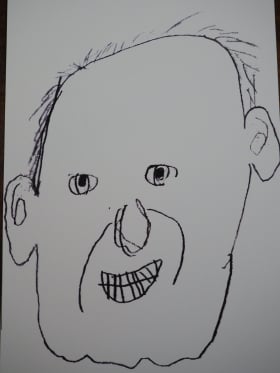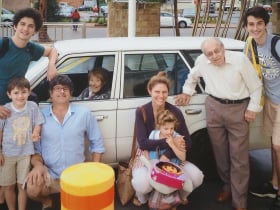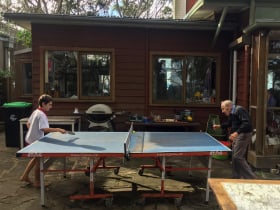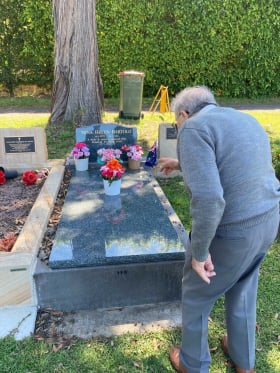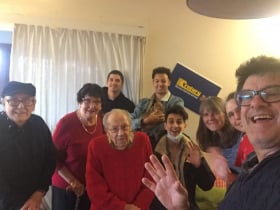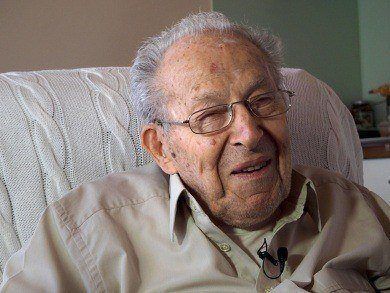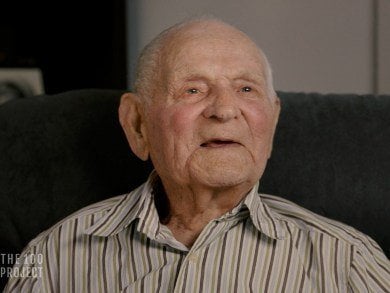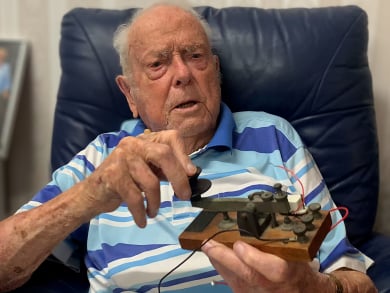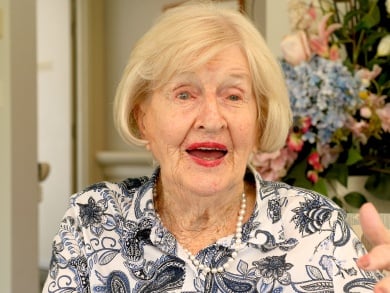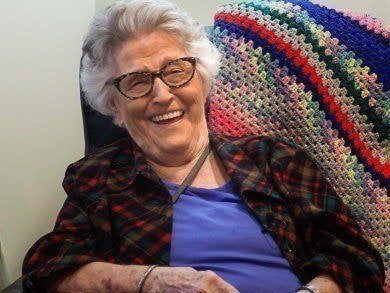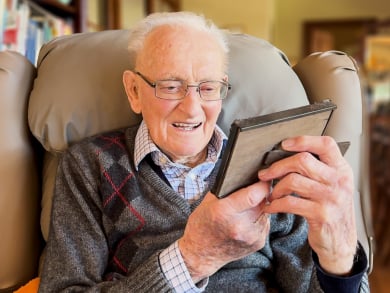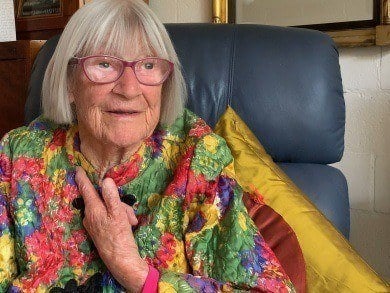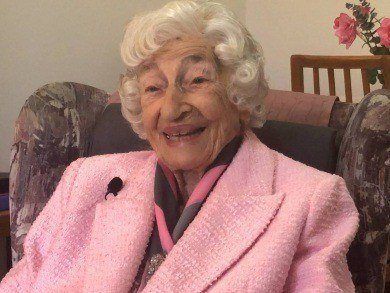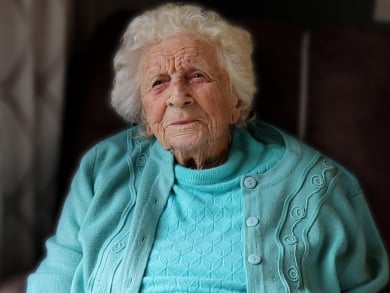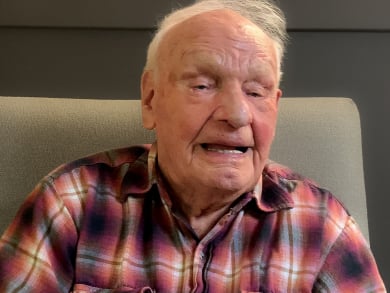Closed captioned icon
View audio transcription
This is how I used to serve.
There...
and I served
and when the ball went on the other side
they didn 't have time to hit it
they came back again to me
I can't do it anymore. My
mother was Greek and my father
was English. British by birth.
I was British by birth. When I was born
it was the First World War, the Turks
were killing all the
Greeks and all the population.
My father put me in a basket
and the British war ships came
and took all the British
subjects away from there just
in time before they killed us.
My mother died when I was one
year old. My father never got
married again. I stayed 6 years
there with some relatives of my
father. They looked after me
and then, we went back to
Greece. My grandmother brought
me up. My mother's mother until
I was 19 or 20 years old when I
left. I stayed with her from
the time I was 6 years old.
Athens is always an
international city like Cairo,
like London, only in a
smaller scale. We had modern
theaters. We had
restaurants, good restaurants,
bad restaurants, old Athens, the
New Athens. You know, it was...
Things that they don't have
here. I used to sing in the big
cathedral, Catholic Cathedral, in
Athens next to our school and I
had a very good strong voice on
the choir. Musicals, American
musicals, and Fred Astaire.
Ginger Rogers... I used to like that but
always we used to like
dramas. French dramas.
Beautiful. The French actors were
very good. I used to enjoy
opera. These songs and
everything. All the Italian singers...
The War spoiled everything. I
didn't know that I have to
leave Greece. The Germans were
1 or 2 days outside Athens. You
could hear the firing and
we left with the last two
boats - all the British subjects,
the refugees... A friend of mine
he came in his car and said
"come on as you are. We have to
leave Athens because the Germans
are coming. Otherwise, we'll be
prisoners, civil prisoners of war."
My father was on one boat and I
was on another boat. And we
went to Egypt. To Alexandria.
We stayed in Alexandria for a
few days and then they took us
to Cairo, as refugees, and the
British government put us in
hotels. Good hotels. And they
were paying us pocket money
every week. When I
decided to go to India from
Egypt, India was under the
British. Egypt was a neutral
country. So, as soon as we go
to India, instead of looking
after us as refugees, we were
enlisted in the army. They wrote
down "volunteers" but we were not
volunteers. They pushed us in.
Dirty trick that. I joined
the Scottish Regiment, the
Second Battalion, the border
regiment. We were going to
Burma and we got on a boat... I'll
never forget that. You know,
the boats about 10 thousand
ton boats - or 15, I don't
remember... That many soldiers
there, guns and all that and
the boat was like that. We're
going out of Calcutta and we
were going to make a landing
in Burma. One bomb, a cannon bomb, the
boat would go down. You've got no
idea. Anyway, when we went
halfway, it came through that
the Japanese occupied Burma before
we got there, and the boat turned
around came back. We were
all praying to God. "Thank you!".
That's what I say I was very
lucky. I was meant to live.
I wasn't meant to go. We were there
till we were discharged. I was
ready to go to America because
I had an uncle there and they
had the papers ready. Instead,
I got a letter telegram from
Australia - a good friend of
mine. Instead of going to
America, I went to Australia.
That's how I came here. By
boat. It took a long
time. We had a couple of submarine...
not attacks... enemy submarines. We were
in a convoy of a lot of boats
and we came to Fremantle. Stayed
there for two nights and then
we went to Melbourne and then
from there to Sydney. And when
I arrived here, the first
different thing I saw... When I
saw women conductors in the...
I've never seen women doing
jobs like men, you know. I was
very surprised. When I went to
Australia, the person who
brought me to Australia, my
friend we were like brothers, he
had a coffee lounge with his
father and I got in the coffee
lounge with him and they
taught me how to cook, how to
to serve people, and my future
wife used to come for her
breakfast every morning. She
was just discharged from the Air
Force and I saw her every day, and
because she was so cheeky,
people waiting to be served and
she used to run in front all the
time and we come to know each
other. That's all. My
upbringing was different to
the average English or other
nationalities. I was taught that
once you're married, you're
married for life. And I went
with my wife, with my future
wife, for 3 years. We both
decided to know each other well
before we get married. If
something I don't like in her
and something she doesn't
like in me and after 3 years,
three and a half years, we
found out we can live with
other, although we had a couple
of small fights, you know, but
that was it...
That's my wife.
That's another favorite. I like
it very much. When I first met
her, she looked like that. And
when she passed away, she
looked like that.
She still have the youthful
face. Always smiling.
I thought the world of my wife
and she thought the same with
me. When you're married for so
long, only a few months off 70
years, my wife got sick and she
passed away after a couple of
years. I have to stop for a
little while because I'm overcome.
I'm very emotional.
Anyway, she was a nice person.
I couldn't find any
faults on her. She devoted
herself for me and her family
and all that. And although I was
a migrant - at first they didn't
know me - but when they came to
know me, I was one of them.
That's it. I miss my wife I'm
living with you now, with my son,
and I enjoy watching the
grandchildren but it's not the
same like you bring up
amongst your family. Something
is missing. You don't know what is missing.
To be in a new
country without knowing the
language properly, to be
penniless... It's very hard to go
to a country that you don't
have any contacts. My contacts
were one or two. Very few. Then
you don't know where the next
dollar comes from. It's very, very
hard. The factories was better
for me because I was one in a
crowd and all English, no Greeks
or anything like that and I had
to pick up all the slang
language and the swear words
and everything. And also I
learned the trade. I told
them that I was tradesman when I
wasn't a tradesman. I didn't
have a clue. I was asking the
others what to do in the
machine I was working. And they
tell me. I knew next time,
somebody else I knew. I
pretended my way through,
that's all. I lied a lot, I said a
lot of lies. Where's your
papers and all that? "I had to
swim when the Germans came in.
I didn't even have clothes to wear."
**** They they were feeling
sorry for me... Oh David, it's not
easy you know... Life was amazing.
Oh God help... I don't think
I'll be here but next war will
be the destruction. They used
to say the same for this war,
if there's another war but the atomic bombs
and all that. Can you imagine a bomb
in New York with all these
tall buildings. Be the end of
the world I think. God help us. Everybody
has the atomic bomb now.
That's why people are silly.
Instead of being nice to be
free to travel to any country,
and all that, they're fighting
about borders and then...
Anyway
I would like to see more
respect with each other, you
know? And you should respect
somebody's religion. You should
respect dark people. You should
respect Chinese.
You should respect any nation at all.
If I suffer in any way, I like to see you
happy. And Emily. Go out,
enjoy yourself while you're
young, enjoy your children
while they're young, even here
that I am. Ben and Nina, they grew
too quick. Before I know where
I am, I feel like I came
yesterday here. Look at them.
I was looking at Ben
and Nina. They're that high now,
they're up there. Change. So enjoy,
enjoy them now.
I wish I knew
what's after death.
Are we still there? I was
brought up to believe in God, in
Jesus...
People that they were very
religious... something happens and
they change. I don't know what
to say. There's a lot of
answers. A lot of questions I
have but nobody can give the
answers.
I'm a drop in the ocean. Like
everybody else, I go too.
Thanks To
David Bartolo
William “Bill” Bartolo
"I’m a drop in the ocean"
A centenarian recalls his remarkable WWII journey from Greece
Born in Turkey to a Greek mother and an English father, William Bartolo was brought up in Athens, a city of which he still speaks fondly.
In his words, “WW2 changed everything”. With the invasion of the Germans he fled to Egypt and then on to India where he was ‘tricked’ into joining the British Army.
Surviving the War, he migrated to Australia.
His reflections on love, family and the future are a potent mix of emotions and memories.
Age in Video
100 yearsDate of Birth
3rd June 1920Place of Birth
Smyrna (Izmir), TurkeyThanks To
David Bartolo
